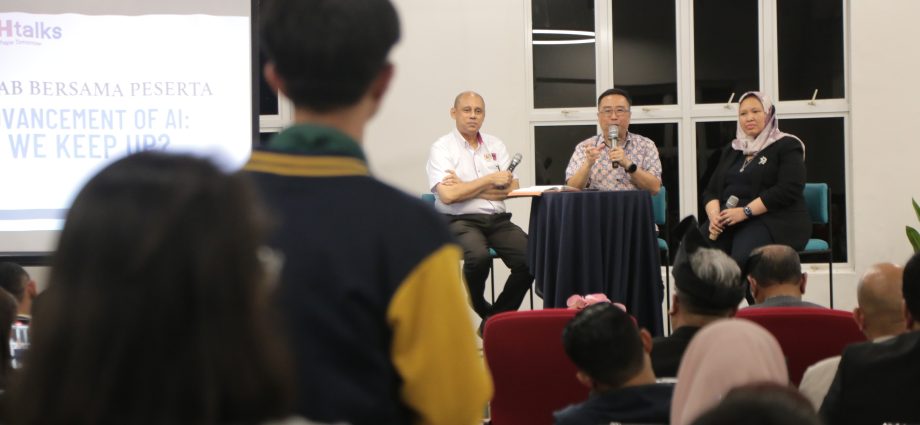- Malaysia leads region in tech talent despite local doubts over AI readiness
- Minister urges the workforce to embrace AI as an enabler while building technological sovereignty
Malaysia aims to become a high-tech nation by 2030, but must overcome challenges of scepticism and AI anxiety while leveraging its strengths in science and engineering talent.
During the TECHtalks event held at Universiti Malaya yesterday, Minister of Science, Technology and Innovation, Chang Lih Kang, addressed concerns about Malaysia’s technological readiness while highlighting the country’s current ranking of 33rd out of 133 countries in the 2024 Global Innovation Index.
“We want to be a high-tech nation by 2030,” Chang stated, while confronting several challenges facing the nation’s technological ambitions.
Dispelling local talent cynicism
Chang countered widespread scepticism about Malaysia’s talent capacity by highlighting that within the Global Innovation Index’s 82 sub-indicators, Malaysia ranks first in three categories: percentage of science and engineering graduates, high-tech exports, and creative goods exports.
“Our problem is fear. We always fear that we are losing out,” Chang said. “We thought that we are not good enough, that others are better. This is a very wrong perception.”
Addressing AI workforce anxiety
The minister also addressed anxieties surrounding AI potentially replacing the Malaysian workforce.
“Whenever there’s new emerging technology, people would be really anxious about being replaced, but I can assure you that is not going to happen. AI is an enabler,” the minister assured.
“We have the ability to continuously learn, which cannot be replaced by any technology,” he added.
With 97% of Malaysian companies being SMEs and only 13% having adopted AI technology, Chang emphasised the importance of maintaining an open mind and learning new skills such as AI, robotics, or coding.
“You just need to know a little bit more than your profession,” Chang advised.
The real impact of AI on employment
Ts Habsah Nordin, Petronas’s Head of AI Centre of Excellence, shared key findings from Talentcorp during the event. “620,000 jobs, about 17-18% of the 3.5 million jobs, are expected to be impacted,” she said, clarifying that “impacted” doesn’t necessarily mean job losses, but rather the creation of new types of jobs.
According to the World Economic Forum, 22% of global jobs will undergo restructuring by 2030. A Forbes article further indicates that 70% of jobs will experience skill shifts by 2030 due to AI impact, with 29% of core job skills changing due to AI advancements.
“Therefore, if we do not disrupt ourselves, AI will disrupt us,” Habsah warned.
“Even at my age, in order to undertake the role of being the Head of AI Centre of Excellence, I felt that I needed to equip myself with the right competency, so I went for my certification as an AI transformation leader in the US,” she added.
Five types of agility needed
Habsah outlined five essential types of agility needed to navigate the paradigm shifts caused by AI:
- Self-awareness: Understanding one’s own capabilities and limitations
- Mental agility: Thinking critically and navigating complexity
- People agility: Working differently and collaboratively across changing roles
- Change agility: Navigating through evolution of change through both mindset and productive learning
- Results agility: Rapidly building results with tangible outcomes
Malaysia’s nascent AI sovereignty
While the government remains committed to transforming Malaysia into a high-tech nation, scepticism surrounding AI adoption and advancement persists among Malaysians, alongside concerns about overdependence on foreign investors for technological development.
During a Q&A session, Zach Othman, co-founder and CEO of AI startup Lekir Tech, raised concerns about Malaysia’s AI sovereignty, noting the country’s dependence on foreign technology such as Amazon Web Services, which forms the core framework of many local products.
Chang acknowledged this challenge: “At the moment, it’s not easy to talk about AI sovereignty because we are at a very nascent stage where our priority is to develop the technology, make our population more AI-savvy, and increase the adoption of AI, as well as trying to help our AI startups to flourish.”
“However, we are also developing our own large language model so that we can have our own set of data instead of relying entirely on our foreign investors,” he added.
Government investment in AI education
The minister also revealed that following last year’s RM20 million allocation to Universiti Teknologi Malaysia to establish an AI faculty, the government will commit an additional RM50 million to five universities for specialised AI development in different sectors.
These include Universiti Malaya (AI in medicine), Universiti Putra Malaysia (cybersecurity), Universiti Kebangsaan Malaysia (large language models), and Universiti Sains Malaysia (semiconductors).



